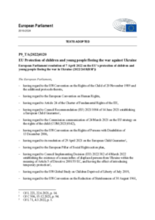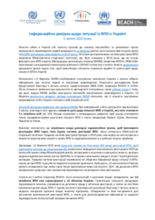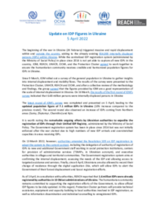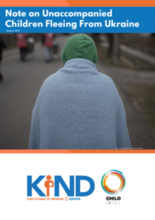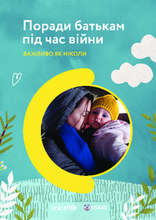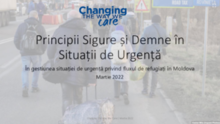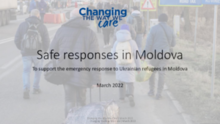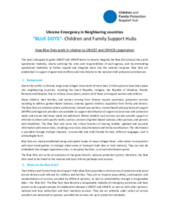This section includes resources, news and other key documents related to children's care in the context of the current humanitarian crisis affecting Ukraine and surrounding countries. This section is updated daily.
News
Featured Resources
Related Tools and Guidance
Country Care Snapshot
Events
Other Resources
Displaying 91 - 100 of 194
The International Data Alliance for Children on the Move (IDAC) held this webinar on April 11, 2022, to discuss the need for concrete data and information crucially needed to support affected children inside and outside Ukraine. Representatives of countries directly affected by the Ukrainian crisis as well as key partners on the ground shared their insights.
On 7 April 2022, the European Parliament adopted a resolution on "EU Protection of Children and Young People Fleeing the War Against Ukraine" calling for greater protection of children fleeing war in Ukraine, particularly vulnerable children, for the registration of children entering the EU from institutional care, as well as monitoring their well-being and location in the EU. MEPs called on member states to halt child adoptions in order to avoid further or permanent separation of children from their parents and families against their best interests.
Останній раунд дослідження, яке провела МОМ, був завершений, а його результати презентовані 5 квітня, унаслідок чого вдалося оновити дані щодо кількості ВПО в Україні, яка нині становить 7,1 мільйона осіб (на 10% більше порівняно з попередньою цифрою). Цей раунд опитування також продемонстрував зростання кількості ВПО з числа мешканців Півночі (Суми, Житомир, Чернігів) та Києва.
The latest round of IOM’s survey was completed and presented on 5 April, leading to the updated population figure of 7.1 million IDPs in Ukraine (10% increase compared to the previous round). The second round also observed an increase of IDPs coming from Northern areas (Sumy, Zhytomyr, Chernihiv) and Kyiv.
In response to requests for information, ECRE has compiled a non-exhaustive document of measures taken by European countries to address the arrival of people fleeing the war in Ukraine (UA). The document provides country-by-country information regarding two main areas of policy and legal developments in response to arrivals from UA: the first part identifies measures adopted on entry/stay requirements, reception-related arrangements, as well as asylum procedures; the second part provides information on national measures implementing the Council implementing decision of the Temporary Protection Directive, or establishing other special statuses for persons fleeing Ukraine.
This briefing paper focuses on responses in the European Union (EU) to the arrival of unaccompanied children fleeing from Ukraine.
In the brochure, you will find the basic rules of safety, hygiene, nutrition, vaccination, psychological support - the answers to the questions that are currently most relevant are collected in one material prepared by UNICEF with the support of the United States Agency for International Development (USAID).
Instruirea „Principii Sigure și Demne în Situații de Urgență” oferă spre discuție subiecte importante precum responsabilitatea noastră de a proteja copiii și adulții expuși riscului în situația de urgență actuală; principiile „de a nu face mai rău
The training Safe Responses During Emergency Situations covers topics such as our responsibility to protect children and adults at risk in an emergency, the principles of 'do no further harm’ and 'best interests of the child’ in practice; the four Rs: recognition; response; reporting; recording and what we can and should practically do in an emergency situation.
This note is designed to guide UNICEF and UNHCR teams on how to integrate the Blue Dot concept into a joint operational modality, clearly outlining the roles and responsibilities of each agency, and recommending operational modalities to further expand and integrate these into the national response. Blue Dots are established in support of government efforts and links directly to the national child protection architecture.

